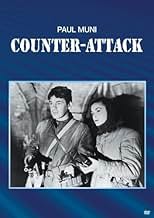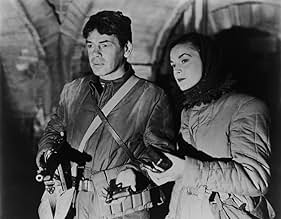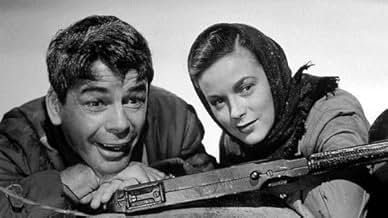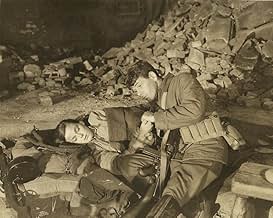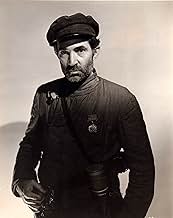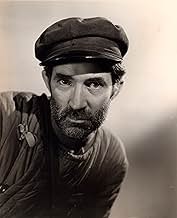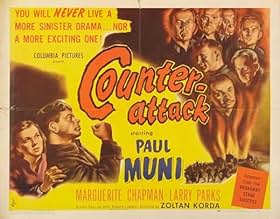AVALIAÇÃO DA IMDb
6,8/10
581
SUA AVALIAÇÃO
Adicionar um enredo no seu idiomaDuring WW2, a Mexican stand-off ensues between a group of German soldiers and a team of Soviet fighters trapped together in the basement of a bombed-out Russian building.During WW2, a Mexican stand-off ensues between a group of German soldiers and a team of Soviet fighters trapped together in the basement of a bombed-out Russian building.During WW2, a Mexican stand-off ensues between a group of German soldiers and a team of Soviet fighters trapped together in the basement of a bombed-out Russian building.
- Direção
- Roteiristas
- Artistas
Wolfgang Zilzer
- Krafft
- (as Paul Andor)
Louis V. Arco
- German Colonel
- (não creditado)
John Bagni
- Paratrooper
- (não creditado)
Trevor Bardette
- Petrov
- (não creditado)
Richard Bartell
- Ostrovski's Assistant
- (não creditado)
Avaliações em destaque
Recently saw this movie on TCM. Very powerful. It concerns a Russian soldier (Paul Muni) and a female resistance agent (well played by Marguerite Chapman, who I'm not familiar with) trapped in a bombed factory (?) with seven Germans. The director has some better known films, including "Four Feathers." Muni is well known. The others appear to be character actors.
It becomes a battle of wills, most of the action taking place in a condensed space -- the small area they are trapped in. But, meanwhile, we also get some excellent shots of the happenings outside in the battlefield and thereabouts. These add a nice touch to the movie, realistically so as well (a sort of newsreel feel in some cases).
The movie has a 1945 publication date but is played basically straight. It is always interesting as well when Russians are the good guys.
It becomes a battle of wills, most of the action taking place in a condensed space -- the small area they are trapped in. But, meanwhile, we also get some excellent shots of the happenings outside in the battlefield and thereabouts. These add a nice touch to the movie, realistically so as well (a sort of newsreel feel in some cases).
The movie has a 1945 publication date but is played basically straight. It is always interesting as well when Russians are the good guys.
An astringent war film atmospherically shot by Oscar-winning cameraman James Wong Howe with an attention to detail it doubtless owes to its stage origins.
As befits a film scripted by one of the Hollywood Ten, one of the Russians is a noble-looking young woman with a rifle, while the Nazis are an even more than usually devious and shifty bunch. One of the shiftiest is 'the Professor', played by Ludwig Donath, who ironically twice played fellow cast-member Larry Parks' father Cantor Yoelson before they both joined screenwriter John Howard Lawson on the blacklist.
As befits a film scripted by one of the Hollywood Ten, one of the Russians is a noble-looking young woman with a rifle, while the Nazis are an even more than usually devious and shifty bunch. One of the shiftiest is 'the Professor', played by Ludwig Donath, who ironically twice played fellow cast-member Larry Parks' father Cantor Yoelson before they both joined screenwriter John Howard Lawson on the blacklist.
It's 1942 and the Soviets have fallen back under German attack. The Soviets are secretly building a bridge to launch a counter-attack. They sent paratroopers to help partisans in enemy territory to locate German forces. With intel of impending German reinforcements, they launch a surprise attack. Paratrooper Alexei Kulkov with local guide Lisa Elenko take seven German soldiers prisoners but become trapped under a collapsed building.
This was shown at a time when the Soviets were still Allies. Aside from the war action scenes, this is essentially an one room play. My only concern is that I don't see these characters talk so easily. The writing is definitely trying to be smarter than most. Alexei should definitely force the prisoners to sit down. There is a few things about this that rings a little false. It wouldn't matter as much if this isn't reaching for the higher levels. This is not the standard war movie. It's trying to be more and the little annoyances hurt.
This was shown at a time when the Soviets were still Allies. Aside from the war action scenes, this is essentially an one room play. My only concern is that I don't see these characters talk so easily. The writing is definitely trying to be smarter than most. Alexei should definitely force the prisoners to sit down. There is a few things about this that rings a little false. It wouldn't matter as much if this isn't reaching for the higher levels. This is not the standard war movie. It's trying to be more and the little annoyances hurt.
During World War II, Hollywood did something they never would have dared do before the war or only a couple years after the war...they made Pro-Soviet movies. In films such as "The North Star" and "Song of Russia", the Russian people are portrayed as noble, decent and, above all, America's friends. Why? Well, because the Soviet Union was an ally of the USA during much of the war...and the films were propaganda pieces aimed as softening the views Americans had of the USSR (which had often been very negative before this). "Counter-Attack" is another of these pro-Soviet films. Now this isn't saying it's bad...but it did serve the purpose of improving American perceptions of these allies.
The plot of this one is very simple. A pair of Russian soldiers are trapped under debris in the basement of a building...and there are about a half dozen Germans trapped with them. Alexei (Paul Muni) has gotten the drop on them...disarming them and taking them prisoner. But he cannot escape...and while they are trapped, he decides to ask these Germans questions, as he has good reason to believe that one of them is an officer in disguise as an enlisted man. But time is working against him, as he cannot sleep or they'll kill him. And, he hopes that his Russian comrades come before the Germans do to rescue them.
This film isn't as wide-eyed and saccharine as the pro-Soviet films I listed above. Instead, it's intelligent without laying the propaganda on too thickly. As a result, it's a very good film...and isn't yet another silly pro-Russian story. The only negative is that the story, at times, tends to be rather talky.
The plot of this one is very simple. A pair of Russian soldiers are trapped under debris in the basement of a building...and there are about a half dozen Germans trapped with them. Alexei (Paul Muni) has gotten the drop on them...disarming them and taking them prisoner. But he cannot escape...and while they are trapped, he decides to ask these Germans questions, as he has good reason to believe that one of them is an officer in disguise as an enlisted man. But time is working against him, as he cannot sleep or they'll kill him. And, he hopes that his Russian comrades come before the Germans do to rescue them.
This film isn't as wide-eyed and saccharine as the pro-Soviet films I listed above. Instead, it's intelligent without laying the propaganda on too thickly. As a result, it's a very good film...and isn't yet another silly pro-Russian story. The only negative is that the story, at times, tends to be rather talky.
After the fall of the Soviet Union in 1991, East European sources began putting World War II stories on film. And, some movies that had been made since the 1970s were being released in the West. As a result, most people in the West for the first time saw the contributions Russia had made to help win the war. These films tell stories about the war on the Eastern Front, and the ravages of war on those countries and their people. But there were some movies made much earlier in Hollywood about Russia's fighting Germany. Americans living during World War II would have seen those films. They were produced to show Americans the heroic efforts of the Russians as allies in WW II, and to win public support for the U.S. programs to supply arms and weaponry to Russia.
But, unlike other movies produced during the war years, the films on Russia's conflicts with the Germans were not shown as reruns in theaters or on TV beginning in the 1950s. No sooner had the war ended, when Joe Stalin began his power grab to control and enslave many eastern European countries and to oppress and murder his own people. Thus, the former ally in war was now an enemy in peace and a threat to western democracy. So, reruns of wartime propaganda films about the freedom-fighting Russians would conflict with the news of the day and the horrors reported on the Soviet oppression. The Cold War was on.
But now the Cold War is more than two decades behind us. With modern technology we can transfer movies from film to DVDs. And, so older films too are now available. One of the best of those is "Counter-Attack," starring Paul Muni. The movie came out in 1945 and is based on a play that ran on Broadway in 1943. A very strong point of the film is that it doesn't portray German soldiers or Russians as buffoons or as ignorant. Indeed, the dialog of the Russians in the early scenes, and of Muni throughout the film, is of intelligent, discerning individuals. While the Germans are the enemy here, none of those individuals portrayed is seen as uneducated. They do come across as menacing and clever.
The plot is excellent, and the directing and cinematography are exceptional. Muni plays his role perfectly, and several of the Germans are very good. This is a good propaganda film that put a WW II ally in good standing with Americans. If all Russians were like Muni and the rest of his special unit, we knew we had a competent, tough and capable ally. One worth fighting for and with. This movie is a welcome addition to my WW II film library.
But, unlike other movies produced during the war years, the films on Russia's conflicts with the Germans were not shown as reruns in theaters or on TV beginning in the 1950s. No sooner had the war ended, when Joe Stalin began his power grab to control and enslave many eastern European countries and to oppress and murder his own people. Thus, the former ally in war was now an enemy in peace and a threat to western democracy. So, reruns of wartime propaganda films about the freedom-fighting Russians would conflict with the news of the day and the horrors reported on the Soviet oppression. The Cold War was on.
But now the Cold War is more than two decades behind us. With modern technology we can transfer movies from film to DVDs. And, so older films too are now available. One of the best of those is "Counter-Attack," starring Paul Muni. The movie came out in 1945 and is based on a play that ran on Broadway in 1943. A very strong point of the film is that it doesn't portray German soldiers or Russians as buffoons or as ignorant. Indeed, the dialog of the Russians in the early scenes, and of Muni throughout the film, is of intelligent, discerning individuals. While the Germans are the enemy here, none of those individuals portrayed is seen as uneducated. They do come across as menacing and clever.
The plot is excellent, and the directing and cinematography are exceptional. Muni plays his role perfectly, and several of the Germans are very good. This is a good propaganda film that put a WW II ally in good standing with Americans. If all Russians were like Muni and the rest of his special unit, we knew we had a competent, tough and capable ally. One worth fighting for and with. This movie is a welcome addition to my WW II film library.
Você sabia?
- CuriosidadesUnderwater bridges were a real Soviet Army engineering feat used in WWII. A report on such submerged bridges was published in the U.S. War Department's journal "Tactical and Technical Trends", no. 29, July 15, 1943.
- Cenas durante ou pós-créditosOpening credits prologue: In 1942, Russia had been invaded to a depth of a thousand miles, and her armies seemed crushed. The world didn't know that these same "beaten" armies would turn, take back every foot of ground they had lost and then invade Germany itself.
One night in this same year, 1942 . . . .under cover of fog . . . .Russian engineers were engaged in a strange activity . . . .on a river, facing the German lines . . . . .
- ConexõesReferenced in Nosso Amor de Ontem (1973)
Principais escolhas
Faça login para avaliar e ver a lista de recomendações personalizadas
Detalhes
- Data de lançamento
- País de origem
- Idioma
- Também conhecido como
- Counter-Attack
- Locações de filme
- Empresa de produção
- Consulte mais créditos da empresa na IMDbPro
- Tempo de duração1 hora 30 minutos
- Cor
- Proporção
- 1.37 : 1
Contribua para esta página
Sugerir uma alteração ou adicionar conteúdo ausente


